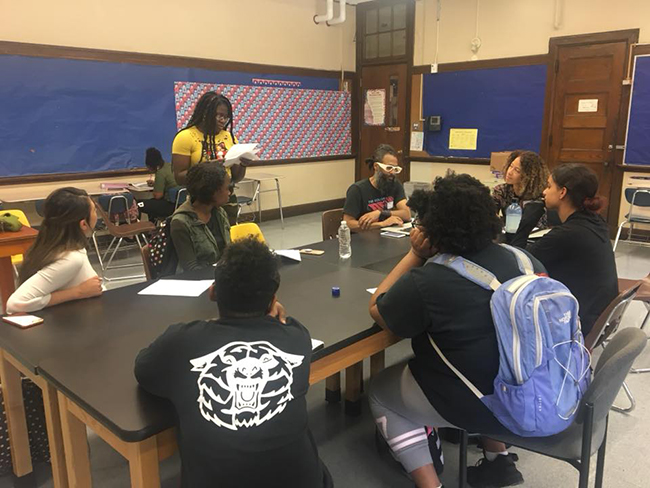TMI Project staff recently read Ijeoma Oluo’s So You Want to Talk About Race. Why do you think race is such a tricky topic?
M: The concept of race is one of the greatest tricks that we’ve ever fallen for. It was designed to make sure the minority who had power kept that power. If all poor people realize how much they have in common, the power structure will change. Racism was created to say to the poor, white person, “Hey, you’re better than those black people.” It’s based on economics and power. And so the whole thing unravels if you talk about it. Not just race as a system of oppression, but all power structures unravel if you tease out this question of, “Who has power and why?”
D: If you’re black or a person of color, it’s not hard to talk about it. That is all we ever think and talk about to ourselves. “What the f**k is going on?” is what we’ve been saying as long as I’ve been around. It’s that secret conversation you have among other people of color or with a few trusted white friends. But it’s not something you ever bring out into the wider discourse. Because the conversation always devolves into, “Who pays for things? I didn’t do anything wrong. Why should I be responsible?”

Above: TMI Project Workshop Leaders Dara Lurie (she/her) and Micah (he/him) teaching a Black Stories Matter workshop to students at Kingston High School.
In your opinion, how can we use initiatives like Black Stories Matter to tackle systemic racism within our systems of power? Aka: How can we take something that’s so emotionally-charged and turn it into policy change?
D: I’m reading the book My Grandmother’s Hands right now. The author Resmaa Menakem is a somatic therapist, and he talks about the trauma that was “blown into the African bodies by the white colonizers and slave owners.” But also the trauma that white refugees from Europe brought with them. They brought punitive systems from England where people were taken to the gallows, lynched and flogged. This unmetabolized trauma was held within the European settlers who then blew it into enslaved Africans. Menakem says the solution to systemic racism is within the body. That resonates with me. It needs to be felt in the body – and storytelling is one way we reach that understanding.
M: I understand the desire to answer questions like, “What more can we do? What are the next steps?” But the simple power of saying “Black Stories Matter” should not be underestimated. I was talking about it with my son [Gopal Harrington] today because he’s going to read at the Stories from Across Generations show on February 16th, and he said, “My story’s not a black story.” And I said, “You’re black. And you have a story. Therefore, it matters.” That’s what we mean when we say “Black Stories Matter.” We’re saying, “Here’s my black story, here’s how I was impacted by race, here’s what a racist said to me.” It doesn’t matter if your story is about tying your shoes. Your story matters because you’re alive and all black stories matter.
D: The statement “Black Stories Matter” is a statement that nobody’s saying because history has told us that black stories don’t matter. And we’ve all believed it.
M: We all think, “Nobody wants to hear my story.” White. Black. Whatever. But there’s that extra layer for those of us who are black. We recently had to change venues for Stories Across Generations to accommodate more audience members due to demand. So a bunch of white people are effectively saying, “We do want to hear black stories because Black Stories Matter.” We’re changing the narrative, and it’s hard to believe that all these people actually want to come out and hear us tell our black stories. That shit blows my mind.
I read this article the other day, “All black stories matter, not just ones in struggle,” and this resounds so much with what you’re talking about.
D: We’re not looking to tell stock stories of blackness. That’s been done enough.
M: What it boils down to is this: I don’t know the full answer to your question. We should be holding it loosely anyway. TMI Project is naturally evolving. We’re working with high school students, we’re going digital, we’re expanding. If the issue at hand is how we share power, relinquish power, take power, then we’re doing it right because we are collectively figuring out how to share this power and where the Black Stories Matter initiative organically goes next.
This just makes me wonder: what can participants expect of the upcoming Black Stories Matter storytelling workshop on February 17th (the day after Stories from Across Generations)?
D: TMI Project has a really strong methodology and approach to helping people find where their stories are hiding. Some people come in with ideas, and that might be part of the puzzle, but with the writing prompts and exploration, they figure out the rest. Don’t expect to know your story when you first arrive. The workshop opens pathways for people to find their stories, whether they’re coming from a sense of knowing, a sense of curiosity or a sense of yearning.
M: There are a wide range and breadth of stories, not just ones of struggle. At its heart is the fact that all people who aren’t white men have, in some way or shape or form, at some point, been made to feel less than human. It’s important that we connect to the parts of people’s stories that are human and universal. For black people taking this workshop, they can expect to experience a methodology that will help them tell their story. Whatever it is. Because most of our stories are wrapped up in shame, fear–
D: –anger, and guilt–
M: — and guilt. It helps to have somebody else hold a space for you so you can get your story out there. And black people, especially those in the Hudson Valley, don’t have that many spaces. So this workshop will be that space.

No comment yet, add your voice below!